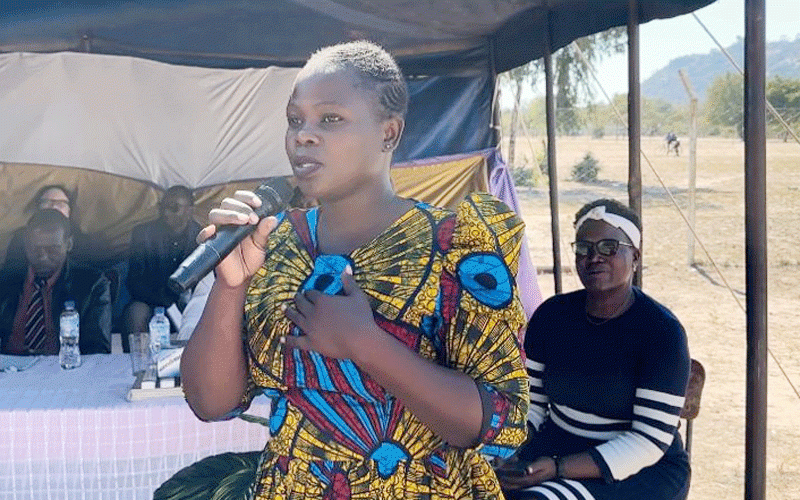
Ruvimbo Topodzi’s childhood was tragically disrupted at the young age of 15, in 2011. While walking home from school in Glen View, a high density suburb in the capital of Zimbabwe, a 22-year-old man approached her with romantic intentions.
Despite her refusal, a misunderstanding arose when her father witnessed their interaction. Mistakenly believing they were already involved, he forced her into marriage with the man.
This cruel twist of fate shattered Topodzi’s educational aspirations. Forced to abandon school, she soon found herself pregnant.
“During my marriage, I endured physical abuse and even went hungry at times. Despite being pregnant, I was denied food,” Topodzi recounted her story to high school students at Mafararikwa High School in Marange.
“It was until the abuse became severe, with excessive beatings and injuries, that my father finally allowed me to return home in 2014.
“Sadly, by then, the chance to continue my education and to become a nurse was gone.”
Mafararikwa High School, partnering with Higherlife Foundation, held a Girls’ Indaba last week. The event equipped students, parents, and community leaders with knowledge about the effects of child marriage and how to combat it.
Marange is nestled in the mountainous border town of Mutare under Manicaland province in Zimbabwe. Marange is traditionally governed by the Marange chieftaincy.
- Tsitsi Masiyiwa appointed END Fund chair
- Higherlife Foundation, government in climate-smart agriculture collaboration
- Collaborative, decisive action can rescue Africa from NTDs
- Ruvimbo Topodzi fights back: From child bride to advocate against early marriage
Keep Reading
This region is home to the Marange Apostolic Church of St. Johanne, which gained international notoriety after the tragic death of 14-year-old Memory Machaya.
She died during childbirth at a church shrine, sparking outrage among citizens and human rights activists.
This incident highlighted the concerning practice of child marriage within Zimbabwe's Apostolic churches, where polygamy is also permitted.
Despite shunning hospitals, these churches attract a large following with promises of healing and poverty alleviation.
In 2016, a landmark case unfolded in Zimbabwe.
Tsopodzi and lawyer Loveness Mudzuru, backed by the Girls Not Brides member ROOTS, challenged the existing Marriage Act in the country's highest court, the Constitutional Court.
The Act previously allowed a child as young as 16 to marry with parental consent. The Court ruled in their favour, striking down this harmful provision. This victory marked a significant step towards ending child marriage in Zimbabwe.
To combat child marriages, Topodzi has established an organisation called the Topodzi Foundation.
“We fight for the rights of girls and work to end child marriages. We empower them through life skills training, aiming to eliminate dependency syndrome and alleviate poverty in the country,” she said.
According to the Zimbabwe’s Multiple Cluster Survey 2019, one woman out of three in Zimbabwe (aged 20 to 49) was married before age 18; 5% of girls were married before age 15.
Chief Marange identified gender-based violence and starvation within families as key drivers of child marriages.
“Parents should stop using gender-based violence as a reason to marry off their children,” he said.
“This violence pushes children to seek refuge in marriage, which is harmful.
“Another factor contributing to child marriages is hunger and starvation within families and society.
“When families are struggling to feed their children, they may see marriage as a way to provide for them, even though it's not a healthy solution.
“In these situations, children are essentially driven out of their homes in search of ‘greener pastures’.
“We have had cases of child marriages reported to us,” Chief Marange continued.
“We take these cases seriously and have worked with the police to ensure the perpetrators are arrested.”
Higherlife Foundation country director Philani Nyatsanza condemned child marriage and its negative effects on society.
“There has been a rise in the number of girls whose futures have been robbed due to early child marriages,” he said.
“These young girls are being sexually abused, impregnated, and denied their futures.
Nyatsanza announced a pilot project by Higherlife Foundation to identify previously married girls and help them return to school. This initiative aims to pave the way for a larger programme.
“As the Higherlife Foundation, we are undertaking a pilot project to identify girls who have been married before and help them return to school,” he said.
“After the pilot project is complete, we will launch a larger programme.
“We urge girls to remain steadfast and stay in school,” Pastor Nyatsanza continued.
“Don't let people take advantage of you. You are the advocates who should carry this message to your families and communities.”
Founded in 1996 by Strive and Tsitsi Masiyiwa, the Higherlife Foundation is a philanthropic organization dedicated to supporting orphaned and vulnerable children across Africa.
Since its inception, the foundation has championed education and material support, empowering young lives.










